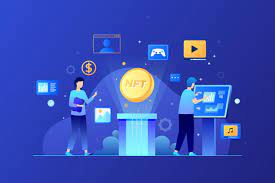


NFTs are unique digital items with blockchain-based ownership. Each NFT is one-of-a-kind and non-interchangeable. They have taken the digital world by storm and are becoming increasingly popular, with interest in NFTs continuing to skyrocket as more is understood about the technology. In this blog post, we explore the world of NFTs in detail:
What Are NFTs?
NFT stands for non-fungible token. NFTs are unique digital items whose ownership and transactions are recorded on the blockchain. Each NFT is completely unique and scarce, meaning one-of-a-kind. Some examples of NFTs include:
· Digital art
· Virtual real estate
· Collectible items
· Rare artifacts
Unlike cryptocurrencies like Bitcoin, each NFT has a different value based on its attributes and how sought after it is on the market. NFTs are revolutionizing ownership of scarce digital goods.
How NFTs Work
NFTs are stored on the blockchain, a public digital ledger. The ownership and transaction logs of NFTs are transparent and secure. Each NFT contains a unique identifying code and ownership details linking it to a specific individual's blockchain address.
When a NFT is purchased, the ownership of that unique token is transferred to the buyer's blockchain wallet address. The new owner has full control and rights over that NFT. NFTs can be bought and sold on secondary markets in a similar way to traditional collectibles.
Some of the blockchains that support NFTs and have marketplaces for buying and selling NFTs include:
· Ethereum - Ethereum is the most popular blockchain for NFTs. NFT marketplaces on Ethereum include OpenSea and Rarible.
· Flow - Created by Dapper Labs, the team behind popular NFT projects NBA Top Shot and CryptoKitties. Has an NFT marketplace called NBA Top Shot Marketplace.
· Binance Smart Chain - Binance's smart contract blockchain has lower fees than Ethereum and supports NFT projects. NFT marketplaces include BakerySwap and Juggernaut.
· Solana - Fast, low-cost blockchain that supports NFTs and marketplaces like Solanart, DigitalEyes and SolSea.
· Wax - Provides an NFT focused blockchain and marketplaces like Atomic Hub for buying and selling NFTs.
NFT Marketplaces
NFT marketplaces are websites where people can buy, sell and trade NFTs. Some of the most popular NFT marketplaces include:
· OpenSea - OpenSea is the largest NFT marketplace, with support for multiple blockchains including Ethereum, Polygon, Klatyn, and Flow. It has a wide range of NFT categories like art, music, domains, virtual worlds, trading cards, and collectibles.
· Rarible - Rarible is an NFT marketplace that focuses on digital art. It supports Ethereum and Flow based NFTs. Rarible allows anyone to create and sell NFTs without needing to code.
· NBA Top Shot - NBA Top Shot is an NFT marketplace for blockchain-based basketball highlight collectibles. It's the most popular sports-based NFT platform, allowing fans to buy, sell and trade officially licensed NBA highlight NFTs.
· Sorare - Sorare is a popular fantasy football NFT game. Users can buy, trade and sell digital football player cards, build teams and compete in leagues and tournaments.
· SuperRare - SuperRare is an NFT marketplace focused on digital art. It features a highly curated selection of rare, one-of-a-kind NFT artworks that users can buy and collect.
The Value of NFTs
The value of NFTs can appreciate or depreciate over time based on several factors:
Scarcity - The scarcer an NFT is, the more valuable it will typically be. This could be due to limited supply, unique one-of-a-kind attributes or discontinued collections. Rare, early NFTs from popular collections are often highly sought after.
Demand - NFTs that are popular and in high demand from buyers typically have higher prices. Trends in the NFT space and hype around certain collections or types of NFT assets can drive enormous demand and price spikes.
Utility - NFTs that provide additional utility or benefits to their holders tend to hold their value well. For example, limited access to communities, events or as a ticket to redeem exclusive rewards.
Ownership and status - Some buyers are willing to pay a premium for notable or rare NFTs to establish status or gain exclusive ownership of a sought after digital asset. For example, rare art or items associated with notable creators.
Speculation - The NFT market is largely unregulated and speculative. Prices can fluctuate wildly based on hype and belief about potential future value. While risky, speculation has been very profitable for some early NFT buyers and sellers.
Perceived brand or IP value - NFTs associated with a valuable brand or intellectual property, like sports teams, musicians, fashion brands or gaming IPs are often very lucrative and hold value well due to fan loyalty and popularity of the brand.
The Future of NFTs
NFTs have revolutionized digital ownership and scarcity. But they are still a relatively new technology with lots of room for growth and innovation. Some possibilities for the future of NFTs include:
Virtual Land and Real Estate - Virtual land and property is an emerging category of NFTs that could grow enormously. Platforms like Decentraland and Sandbox allow people to purchase virtual land and build on it.
Gaming Items and Assets - Gaming is one of the biggest entertainment industries, and NFTs can be used to represent in-game assets like land, items, skins, weapons, and other collectibles. This could be a multi-billion dollar market.
Physical Redemption - Some NFTs will provide owners with the ability to redeem their digital token for a physical item. For example, an NFT could represent ownership of designer clothes, limited sneakers, or collectible figurines. This bridges the digital and physical world.
Ticketing and Access - NFTs could revolutionize ticketing for events by providing secure digital tickets that can be bought, sold or traded while reducing scalping and fraud. NFTs can also provide exclusive access or perks to communities and events.
Fashion and Brands - High fashion and designer brands have already started experimenting with NFTs. NFT clothing, handbags, and other luxury goods could allow owners to buy, sell and trade rare digital items and provide additional utility like early access to sales or exclusive launches.
Decentralized Finance (DeFi) - DeFi protocols and platforms could utilize NFTs to represent collateral, loans, liquidity and other financial instruments in a trustless way. This could unlock new capabilities for decentralized lending, borrowing, and investing.
NFTs have a very bright future with many possible applications that expand far beyond just digital art and collectibles. Whether its virtual real estate, gaming items, access passes, financial products or physical redemptions, NFTs could transform ownership and engagement in the digital world. While the technology and markets are still new, the potential scale and impact of NFTs going mainstream is huge.
In summary, NFTs provide digital scarcity, ownership, and provenance that enables new models of monetization and engagement. This is just the start of the NFT revolution, and the technology is likely to have a far-reaching influence on many industries as adoption accelerates in the coming years. The future of NFTs is promising, and those who can position themselves early may find themselves at the forefront of an emergent field with massive opportunities. Overall, NFTs have introduced the concept of reliability and transparency into the world of online transactions, secured through the power of blockchain technology.
